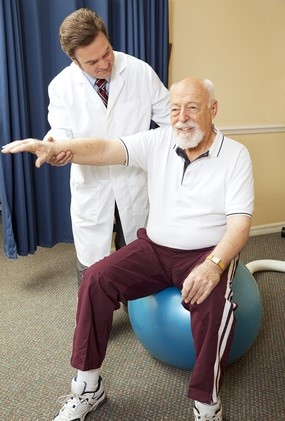
Leading up to Father’s Day, we’re focusing on healthy, happy aging for Dads! We’ll be chock full of advice on caring for aging Dads, resources for men’s health, gift ideas for older Dads and more! Today, we share important information about stroke recovery.
Why is stroke recovery such an important topic?
- Stroke is the leading cause of serious, long-term disability in the United States.
- Strokes are the 4th leading cause of death in men.
- Each year, approximately 795,000 people suffer a stroke. About 600,000 of these are first attacks, and 185,000 are recurrent attacks. Having one stroke puts you at greater risk for having more, so ongoing treatment/prevention is vital.
- Getting fast treatment is key to preventing death and disability from stroke.
- Many stroke survivors continue to improve over time.
Stroke awareness is very important. Please take time to read and share our Stroke Awareness, Prevention and Safety Tips. Know the signs of a stroke so that you can get fast treatment, the most important factor in stroke recovery.
The resulting problems from a stroke vary depending on the severity and location, and can include:
- Weakness, paralysis, and problems with balance/coordination.
- Pain, burning and tingling sensations, or numbness.
- Fatigue.
- Inattention to one side of the body (also known as neglect).
- Incontinence.
- Speech problems or difficulty understanding written or verbal communication.
- Swallowing problems.
- Memory or other cognitive problems.
- Visual problems.
- Depression, anxiety, mood swings or anger.
The stages of stroke recovery
Spontaneous recovery: As the brain heals, abilities begin to come back naturally. This happens somewhat immediately, but also continues over time. This varies, of course, depending on stroke severity and location and overall health/complicating factors.
Rehabilitation: Fortunately, there are many good therapies developed to assist with the effects of stroke, and most people continue to experience stroke recovery during the rehabilitation period. It is important to work with your medical team on the planning process for stroke recovery and seek experiences rehabilitation professionals. Our patient advocates can help you with care planning, choosing the best medical and rehab. professionals and overseeing care, for the best possible outcomes.
Rehabilitation is key to long-term stroke recovery, so the work done during this time is vital. Sometimes the fatigue and emotional or cognitive problems from the stroke can hinder this process. Work with an advocate to get your medical professionals’ help in solving these issues so the patient can benefit from therapy.
Long-term stroke recovery/daily living: There may continue to be adjustments for years to come, or the person may have regained a similar level of functioning to before but will need to monitor health and continue ongoing measures to prevent future strokes. For those returning home, a comprehensive home assessment can help to suggest home modifications and ways to best manage tasks for maximum independence.
In-home caregiver services may be useful to provide household support, ensure a healthy diet and exercise routine, manage medications and assist with follow-up appointments. Support services are especially important during the initial adjustment period.
You may be receiving Medicare home health care for continued therapy or nursing assistance, or you may be participating in on-site therapy and treatments. After you complete such rehabilitation services, we recommend services such as In-Home Fitness to keep you motivated and improving!






